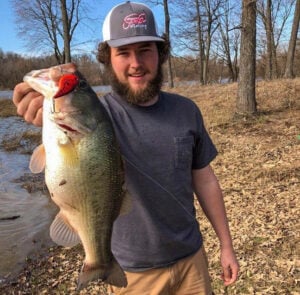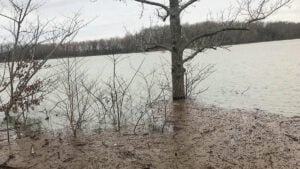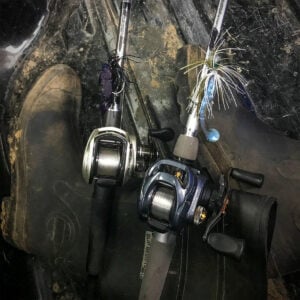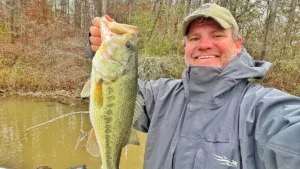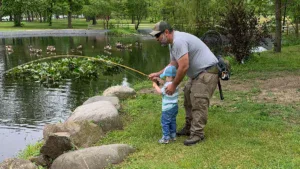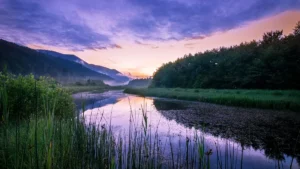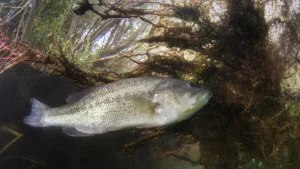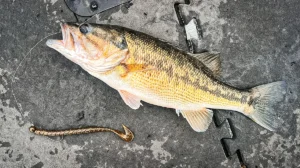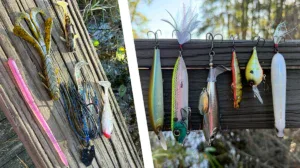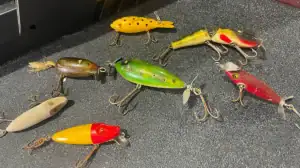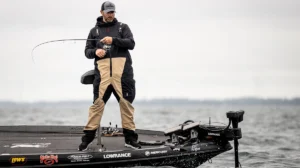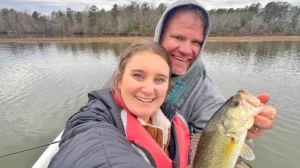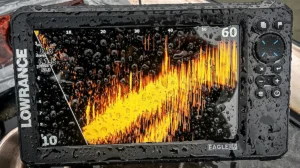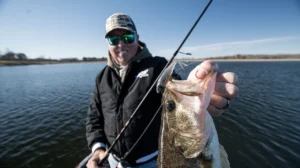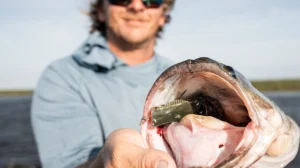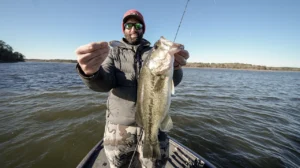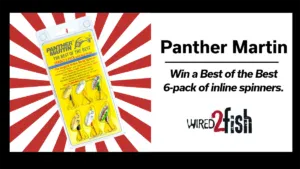We get asked to taylor our fishing articles and videos more to bank fishing for bass and the challenges anglers fishing from the bank often face. But at times, fishing from the bank has advantages over fishing from a boat. The early spring and rising waters is definitely one of those times. So I thought I’d share some tips on making the most of bank fishing when the conditions give an advantage to bank anglers
The four biggest keys to making you more productive fishing for bass from the bank when the conditions get right include the following:
- Be a weather watcher
- Timing water changes
- Understanding seasonal behavior
- Forgetting water temperature
Watching the weather
I think all fishermen become avid weather followers at some point in their fishing life. We try to time our days off and fishing around what the weather man tells us are going to be the enjoyable days. But often the comfort level of us as anglers is not the most important reason to follow the weather in bass fishing.
When I’m watching the weather in the spring a lot of it has to do with rain, sun, wind direction and rain south of me (because on my lake the water comes to us from the south). A big warm rain in Alabama that floods them sends a lot of warm water into our fishery. Warm rains in our area do as well. Runoffs create color in the lake. Color and warmer water will bring fish to the bank and a lot of rain and runoff can create current. Water levels are critical where I live, so I watch those like a hawk.
All of these factors make the bass reachable from the bank a lot easier to catch. The dirtier the water and faster it warms up, the more those bass will be in very shallow water where you can reach them.
Timing the changes right
Some of the toughest fishing from the bank or boat in late winter and early spring can be cold muddy water. You want warming water with some color. The other thing that can be very difficult is when a lake is on a fast rise. While the water is coming up and flooding back into the banks and trees, the fish don’t immediately rush in there with the water.
They get acclimated to new cover being in the water. As the lake starts to crest and even starts to fall, it’s time to get to the bank and get after them. I’ve talked about fishing windows before and that’s important to bank anglers especially.
I’m a student of the lake I live on, Kentucky Lake. I know the layouts of most of the banks, I know where the steeper and flatter banks are and oddly enough I know where I have access to a lot of banks. So as the water got up into the trees this week. I kept an eye on the lake levels and knew it was time to go probing.
First afternoon after work I had about 30 minutes before it was getting dark. It got a lot colder but the water looked perfect for flipping some trees from the bank. I flipped for 30 minutes. Had 4 bites, all big bass. I was a little rusty dodging tree limbs on hooksets, playing them back through shallow water. And two were so deep in the cover I just couldn’t get them out before they finally pulled off. Part of the trouble of fishing from the bank.
I came back the next afternoon and only had 20 minutes this time. I flipped for 5 minutes before hooking and landing a nearly 6-pound bass on a Z-Man Crosseyez Flipping Jig and a Strike King Rage Bug trailer. I came back with an Ark Rods Sniper 7-foot, 6-inch Heavy rod and 20-pound Seaguar AbrazX line on a Lew’s Inshore Speed Spool reel and the mindset to hit them hard and move them fast to me like I was swimbait fishing and swing the fish once I had his head coming my way. I bank flipped her from about 7 feet out.
I feel like later this week after work, I might run around in my truck looking for productive places to flip and really see what I can do in the current conditions.
Understand seasonal behavior
Bass in the prespawn want to feed. Current can make them group up and do that. Flooded cover can make them spread out and do that. Both can make them very susceptible to getting caught. I know the fish are foraging now as the water has warmed and got color and rose. I know when the water gets dirty, hard targets become more comfortable for feeding bass.
I also know that because the water is not super warm the fish aren’t chasing and reacting like they do when it’s a lot warmer. Because of that I soaked the jig in brush and trees. Not one of the fish bit on the initial pitch. That happens a lot later in the spring. But I would hop the jig in place over a small limb or in a piece of cover, 5-10 times before pulling it out and hitting another piece. Sometimes I would flip one side of a tree and then the other.
Fish are feeding, but they also can’t see as well. It takes them a minute sometimes to hone in on the movement, scent, sound and action.
I also know they are opportunists this time of year. So I like a jig and a trailer with some bulk more than a really streamlined plastic. I’m not looking to get 100 bites as much as I’m looking for that one prespawn tank in these optimal bank fishing conditions.
Water temperature is a big misnomer in bass fishing
Your preconceived notions about water temperature can lead you away from great bank fishing if you let it.
People think you can’t catch them flipping and pitching cover because it’s cold. People believe you can’t catch them deep cranking because it’s cold. People think that because the water is cool and muddy, the fish can’t find your lures.
Fish don’t starve because the conditions change on a lake. The biggest smallmouth I heard of being caught for a long time when I lived on Beaver Lake was caught on a Sammy in February. Do you throw a topwater much in February north of the Mason Dixon line? I’ve blistered bass in a foot of water burning crankbaits when it’s snowing outside. The truth about bass is when they decided they are ready to do something, they do it.
Obviously generalities apply in fishing but don’t get so hung up on the temperature outside or of the water that you don’t try things. Maybe a spinnerbait would have got more bites because they could have found it better. Maybe the jig got more bites because they were nosed down in the cover. The thing is to try things but take advantage of your opportunities with the changes in conditions. Water conditions matter more than water temperatures to me.
Water rising and lowering, water clarity and sunshine can be so much more impactful this time of year than water temperature. It was 36 degrees and sleeting, and I was flipping big bass from the bank. I don’t know about you, but that’s the kind of stuff that makes me love fishing that much more.
My final advice
Move around. Hop in your vehicle or use your feet and be mobile when bank fishing. Chances are you will stumble on to a small patch where several big ones have taken up residence. And often times the guy from the bank can get to where the fish are easier than the guy in the boat can. I only had 30 minutes here and there this week to wet a line. I can’t drive, launch a boat and do much damage in that amount of time. But I can go to a few promising stretches, give it a go and if I find it happening there, I bet it’s happening in a lot of similar places around the lake.
Take advantage of the conditions whenever you can in bank fishing. Play the fish fast on a bit beefier tackle if there is a lot of flooded cover. Use drawing power and size to your advantage with your lures. And know how to read cover when bass fishing. Not every tree is a prime target in a forrest of flooded trees. Learn as you get bites what was different about that piece of cover that got a bite when others didn’t.
I flipped up 5 big bass on one stretch from the bank in less than an hour while a big college tournament was happening on the lake. The bank fishing anglers sometimes have the advantages in certain conditions. So don’t miss them.


